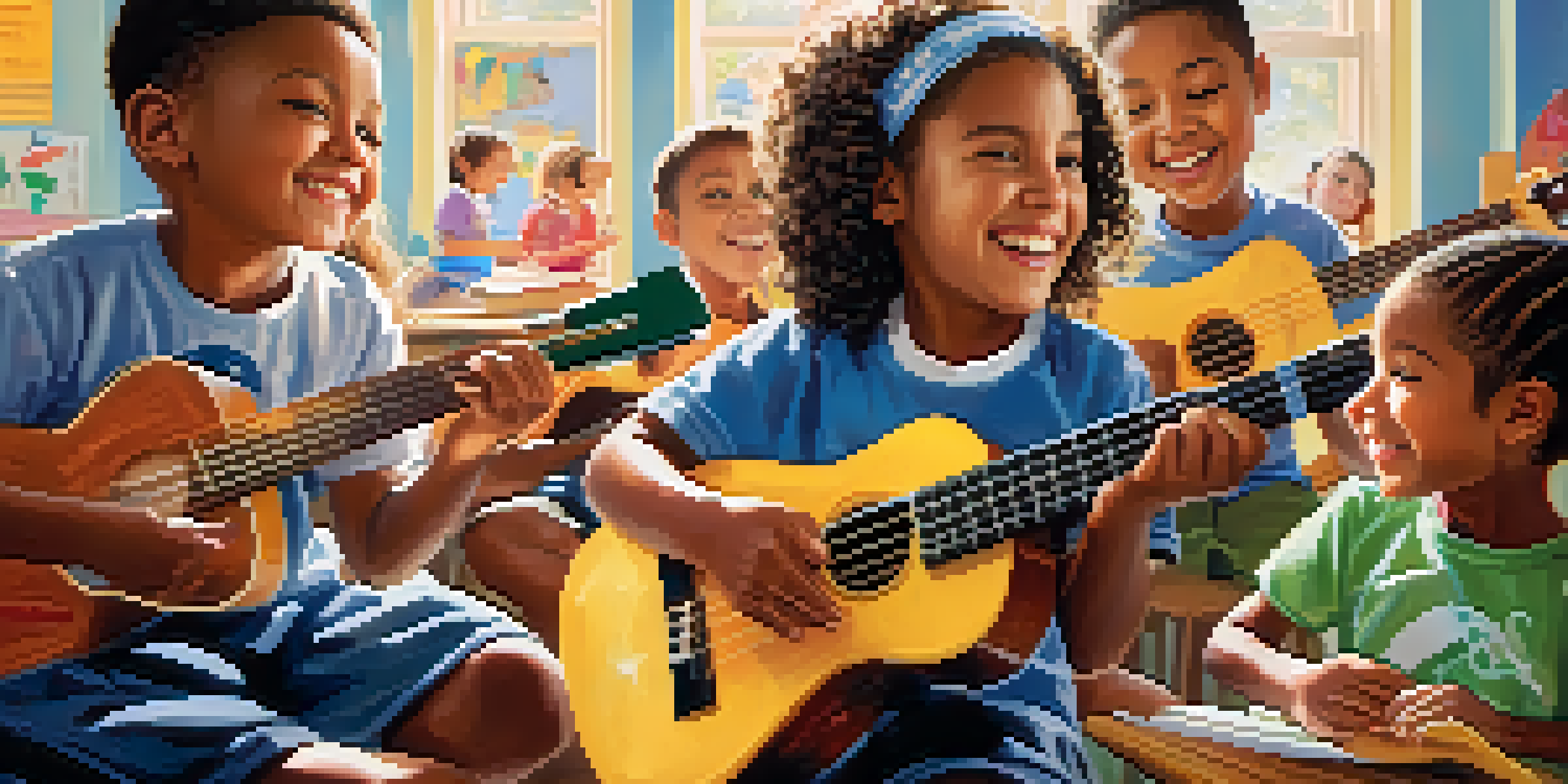The Benefits of Using Ukuleles in Elementary Music Education

Ukuleles: A Fun Introduction to Music for Young Learners
The ukulele is often seen as a friendly gateway instrument for children. Its small size and lightweight nature make it easy for little hands to manage, fostering confidence as they strum away. Unlike larger instruments, the ukulele’s simplicity allows students to start playing songs quickly, which can be incredibly motivating.
Music is the universal language of mankind.
By engaging with an instrument that feels accessible, kids are more likely to develop a lasting love for music. This early exposure can lead to a deeper appreciation for various musical styles and genres. Just imagine a classroom filled with laughter as students enjoy their first jam session together!
Ultimately, introducing the ukulele in music education can spark curiosity and excitement, laying the groundwork for a lifelong musical journey. When children feel successful and engaged, they are more inclined to explore further, whether through playing other instruments or diving into music theory.
Building Essential Skills Through Ukulele Play
Playing the ukulele helps children develop crucial skills beyond just music. For instance, it encourages fine motor skills as they learn to press the strings and strum with rhythm. These physical skills translate into improved coordination, which is beneficial in many other activities.

Moreover, learning to play an instrument fosters patience and perseverance. Children quickly realize that mastery doesn’t happen overnight, and they learn to set goals and work towards them. This experience of overcoming challenges helps build resilience, an essential quality for any learner.
Ukuleles Make Music Accessible
The ukulele's small size and simplicity allow children to quickly learn and enjoy playing music.
Finally, ukulele play promotes teamwork and collaboration when students play together in groups. This not only enhances their social skills but also teaches them the importance of listening and adapting to others, valuable lessons that extend far beyond the music classroom.
Enhancing Cognitive Development with Music
Research shows that music education can significantly boost cognitive development in children. The act of learning music engages various parts of the brain, promoting better memory, attention, and problem-solving skills. When kids learn to play the ukulele, they’re not just strumming chords; they're building neural connections that aid in overall learning.
The best way to predict the future is to create it.
For example, understanding musical concepts like rhythm and melody can enhance mathematical skills. As children learn to count beats and recognize patterns in music, they’re also practicing essential math skills. This cross-disciplinary connection illustrates how music can enrich other areas of education.
Additionally, music education helps improve language skills. Children who engage with music often show better verbal skills and reading comprehension, as they learn to listen and articulate sounds. The ukulele serves as a wonderful tool to cultivate these abilities in a fun and engaging way.
Fostering Creativity and Self-Expression
Music is a powerful medium for self-expression, and the ukulele provides a creative outlet for young learners. As they strum along, children can experiment with different sounds and rhythms, allowing them to express their emotions and ideas uniquely. This freedom promotes creativity, which is vital for problem-solving and innovation.
Encouraging students to write their own songs or create unique arrangements can further enhance their creative skills. With the ukulele, children can easily accompany their lyrics, making the songwriting process more accessible. This practice not only builds confidence but also allows them to share their personal stories and experiences.
Skill Development Through Music
Playing the ukulele helps children build essential skills like coordination, patience, and teamwork.
Moreover, the collaborative nature of music education fosters a supportive environment where ideas can flourish. Kids learn to appreciate diverse perspectives, which enhances their creativity as they explore various musical styles and genres together.
Promoting Cultural Awareness Through Music
Incorporating ukuleles in music education also opens the door to exploring various cultures. The ukulele has roots in Hawaiian music, but it can be used to play songs from different traditions around the world. This exposure helps children appreciate cultural diversity and understand music's universal language.
By learning songs from different countries, kids gain insight into the histories and stories behind the music. This cultural connection enriches their educational experience, making it more meaningful and relevant. It’s fascinating to see how music can bridge gaps and promote understanding among young learners.
Furthermore, this exploration encourages students to share their own cultural backgrounds. As they bring their traditions into the classroom, children learn to value each other's experiences, fostering a sense of community and respect.
Encouraging Lifelong Learning and Engagement with Music
Introducing ukuleles in elementary music education instills a love for music that can last a lifetime. When children experience the joy of creating music, they are more likely to seek out musical opportunities as they grow. This early passion can lead to lifelong hobbies, whether it’s playing in a band or simply enjoying music in their everyday lives.
Moreover, the ukulele is an instrument that can grow with students. As they advance in their musical journey, they can explore more complex techniques and styles, keeping their interest alive. This adaptability makes the ukulele a perfect companion for lifelong musical exploration.
Fostering Cultural Awareness
Learning the ukulele exposes children to diverse musical traditions, promoting cultural appreciation and community.
By fostering a positive relationship with music early on, educators help ensure that children continue to engage with the arts throughout their lives. This engagement not only enriches their personal experiences but also contributes to a more vibrant and culturally rich society.
Creating a Positive Classroom Environment with Ukuleles
Integrating ukuleles into the classroom can significantly enhance the overall learning environment. The act of playing music together brings students together, fostering camaraderie and a sense of belonging. This positive atmosphere can lead to improved behavior and increased motivation among students.
Moreover, music has a unique way of reducing stress and anxiety in children. Engaging with the ukulele allows them to express their feelings and emotions, providing an outlet for any frustrations they may be experiencing. This emotional release can be particularly beneficial in a classroom setting where students face various pressures.

A classroom filled with music and collaboration creates a joyful learning experience. When students feel comfortable and valued, they are more likely to take risks and engage deeply with their education, setting the stage for a successful learning journey.